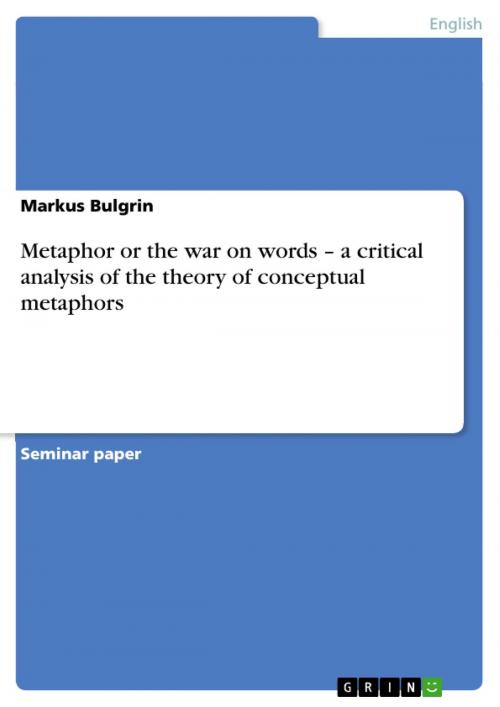Metaphor or the war on words - a critical analysis of the theory of conceptual metaphors
Nonfiction, Entertainment, Drama, Anthologies| Author: | Markus Bulgrin | ISBN: | 9783640141524 |
| Publisher: | GRIN Publishing | Publication: | August 19, 2008 |
| Imprint: | GRIN Publishing | Language: | English |
| Author: | Markus Bulgrin |
| ISBN: | 9783640141524 |
| Publisher: | GRIN Publishing |
| Publication: | August 19, 2008 |
| Imprint: | GRIN Publishing |
| Language: | English |
Seminar paper from the year 2007 in the subject English Language and Literature Studies - Linguistics, grade: 1,0, University of Heidelberg (Anglistisches Seminar ), course: Hauptseminar Cognitive Linguistics, 9 entries in the bibliography, language: English, abstract: Language is versatile. Language is complex. Language can be a mystery. For example, why do we say chair leg although legs are usually thought of being a part of the human body or an animal? Why do we refer to the ground where a river runs through as a river bed? Is a bed not usually an object that we use to sleep in? And why is it that we can say I'm surfing the web although surfing typically means to ride one's board on ocean waves? The news report says, The Iraq democracy is in its infancy. Would we not typically use infancy when we talk about children, or refer to a person's childhood? If we consider the above examples, we can easily draw the conclusion that these words - besides their original meaning - can be used 'outside of their natural environment'. Words and their meaning can be transferred to a different domain. The name for such a transfer is metaphor. [...] This paper will highlight Lakoff's and Johnson's major claim that metaphor is not only a poetic device, or simply a (linguistic) matter of spoken words, but that 'our ordinary conceptual system, in terms of which we both think and act, is fundamentally metaphorical in nature' (Lakoff & Johnson 1980: 3). I shall explain some of the most important devices of their theory, such as target, source, and mapping and briefly elucidate the systematicity that underlies metaphorical conceptualization. The analysis of the conceptual metaphor, LOVE IS A JOURNEY, will reveal some ambiguities about Lakoff's and Johnson's theory. By doing this, I will consider some of the major critiques and analyze whether there is an underlying conceptual metaphoric system in our everyday language.
Seminar paper from the year 2007 in the subject English Language and Literature Studies - Linguistics, grade: 1,0, University of Heidelberg (Anglistisches Seminar ), course: Hauptseminar Cognitive Linguistics, 9 entries in the bibliography, language: English, abstract: Language is versatile. Language is complex. Language can be a mystery. For example, why do we say chair leg although legs are usually thought of being a part of the human body or an animal? Why do we refer to the ground where a river runs through as a river bed? Is a bed not usually an object that we use to sleep in? And why is it that we can say I'm surfing the web although surfing typically means to ride one's board on ocean waves? The news report says, The Iraq democracy is in its infancy. Would we not typically use infancy when we talk about children, or refer to a person's childhood? If we consider the above examples, we can easily draw the conclusion that these words - besides their original meaning - can be used 'outside of their natural environment'. Words and their meaning can be transferred to a different domain. The name for such a transfer is metaphor. [...] This paper will highlight Lakoff's and Johnson's major claim that metaphor is not only a poetic device, or simply a (linguistic) matter of spoken words, but that 'our ordinary conceptual system, in terms of which we both think and act, is fundamentally metaphorical in nature' (Lakoff & Johnson 1980: 3). I shall explain some of the most important devices of their theory, such as target, source, and mapping and briefly elucidate the systematicity that underlies metaphorical conceptualization. The analysis of the conceptual metaphor, LOVE IS A JOURNEY, will reveal some ambiguities about Lakoff's and Johnson's theory. By doing this, I will consider some of the major critiques and analyze whether there is an underlying conceptual metaphoric system in our everyday language.















